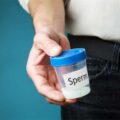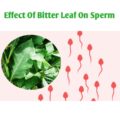Male infertility is when a man has a poor chance of making his female partner pregnant. It usually depends on the quality of his sperm cells.
Sometimes, infertility is linked to sexual function, and other times it could be linked to semen quality. Here are some examples of each:
- Libido. Otherwise known as sex drive, libido describes a person’s desire to have sex. Foods or supplements that claim to increase libido are called aphrodisiacs.
- Erectile dysfunction. Also known as impotence, erectile dysfunction is when a man is unable to develop or maintain an erection.
- Sperm count. An important aspect of semen quality is the number or concentration of sperm cells in a given amount of semen.
- Sperm motility. An essential function of healthy sperm cells is their ability to swim. Sperm motility is measured as the percentage of moving sperm cells in a sample of semen.
- Testosterone levels. Low levels of testosterone, the male sex hormone, may be responsible for infertility in some men.
What is Honey?
Honey is a sweet, viscous food substance made by honey bees and some related insects, such as stingless bees. Bees produce honey from the sugary secretions of plants or from secretions of other insects, by regurgitation, enzymatic activity, and water evaporation. People throughout the world have hailed the health benefits of honey for thousands of years.
Honey is available raw or pasteurized and in a variety of color grades. There are about 320 different varieties of honey, which vary in color, odor and flavor. Honey contains mostly sugar, as well as a mix of amino acids, vitamins, minerals, iron, zinc and antioxidants. On average, it contains about 80% sugar. People remove honey from the hive and bottle it directly, so it may also contain trace amounts of yeast, wax, and pollen.
Some studies have found that consuming raw honey may help with seasonal allergies, and others have concluded that honey can help wounds heal. In addition to its use as a natural sweetener, honey is used as an anti-inflammatory, antioxidant and antibacterial agent. People commonly use honey orally to treat coughs and topically to treat burns and promote wound healing.
Can Honey Boost Sperm Count?
Yes, according to studies, honey can improve serum testosterone concentration, sperm count, and fertility. Sperm production is actually stimulated by hormones other than testosterone but testosterone is required for sperm production.
Honey contains healthful compounds, such as antioxidants, amino acids, vitamins and minerals such as zinc. Observational studies show that low zinc status or deficiency is associated with low testosterone levels, poor sperm quality, and an increased risk of male infertility. Also, taking zinc rich foods like honey increases testosterone levels and sperm count in those who are low in zinc.
Honey is regarded as a natural fertility booster for generations, so much so that the word “honeymoon” is thought to have come from the age-old tradition of newlyweds eating a spoonful of honey each night in order to speed up the baby-making process.
Honey has been used for its medicinal properties for centuries and is often considered a natural remedy for various health conditions. In traditional medicine, honey has been used to treat wounds, digestive problems, respiratory infections, and other ailments.
Some people believe that honey can boost fertility because it contains a variety of nutrients and antioxidants that may help improve overall health. For example, honey is rich in vitamins and minerals such as vitamin C, calcium, and magnesium, which are important for reproductive health. Honey also contains flavonoids and other antioxidants that can help protect the body from oxidative stress and inflammation, which can be harmful to sperm and eggs.
However, it is important to note that there is currently limited scientific evidence to support the claim that honey can boost fertility. While honey has some health benefits, it should not be relied upon as the sole treatment for infertility. If you are experiencing infertility, it is important to speak to a healthcare provider or a fertility specialist who can help diagnose the underlying cause and recommend appropriate treatment options.
Are there any possible side effects of using honey to boost sperm production?
Honey is likely safe to boost sperm count. However, some men are sensitive or allergic to specific components in honey, particularly bee pollen. Although rare, bee pollen allergies can cause serious, and sometimes fatal, adverse reactions. Signs and symptoms of a reaction include:
- Wheezing and other asthmatic symptoms
- Dizziness
- Nausea
- Vomiting
- Weakness
- Excessive perspiration
- Fainting
- Irregular heart rhythms (arrhythmias)
- Stinging after topical application
Honey might also affect blood sugar levels.
If you are experiencing infertility, it is important to speak to a healthcare provider or a fertility specialist who can help diagnose the underlying cause and recommend appropriate treatment options. While natural remedies such as honey may have some health benefits, they should not be relied upon as the sole treatment for infertility.
Alternatives to honey for boosting sperm count
There are several lifestyle changes and natural remedies that may help improve sperm count and overall male fertility. Here are some alternatives to honey that may be helpful:
- Maintain a healthy weight: Being overweight or obese can negatively affect sperm count and quality. Maintaining a healthy weight through diet and exercise may help improve male fertility.
- Quit smoking: Smoking is associated with lower sperm count and reduced sperm quality. Quitting smoking may help improve male fertility.
- Reduce alcohol consumption: Heavy alcohol consumption can lower testosterone levels and negatively impact sperm production. Reducing or eliminating alcohol intake may help improve male fertility.
- Eat a healthy diet: A diet rich in fruits, vegetables, whole grains, and lean protein may help improve overall health and fertility. Some specific foods that may be beneficial for male fertility include oysters, dark chocolate, nuts, and leafy greens.
- Take supplements: Certain supplements may help improve male fertility, including zinc, folic acid, and vitamin C. However, it is important to speak to a healthcare provider before starting any new supplements.
- Manage stress: Stress can negatively affect male fertility. Practicing stress-management techniques such as yoga, meditation, or deep breathing may help improve fertility.
It’s important to note that these lifestyle changes and natural remedies may not work for everyone, and in some cases, medical treatment may be necessary to improve male fertility. If you are experiencing infertility, it is important to speak to a healthcare provider or a fertility specialist who can help diagnose the underlying cause and recommend appropriate treatment options.






